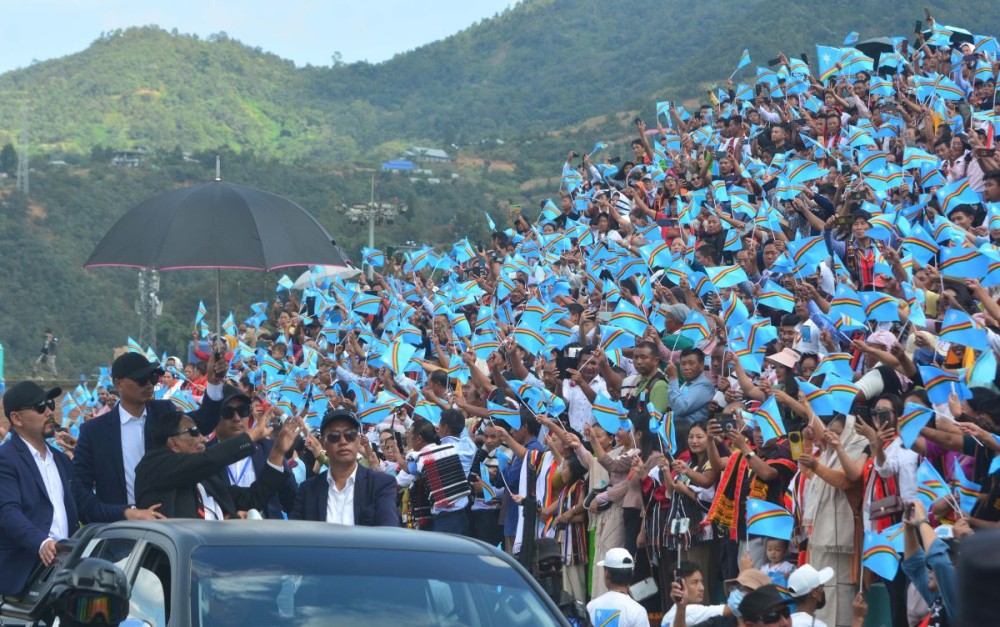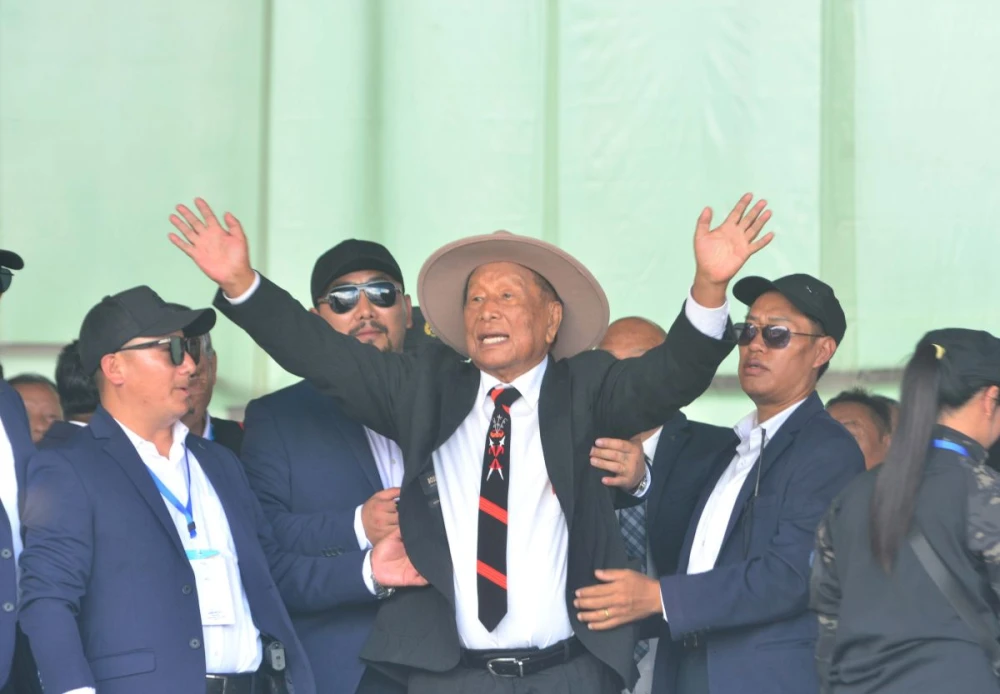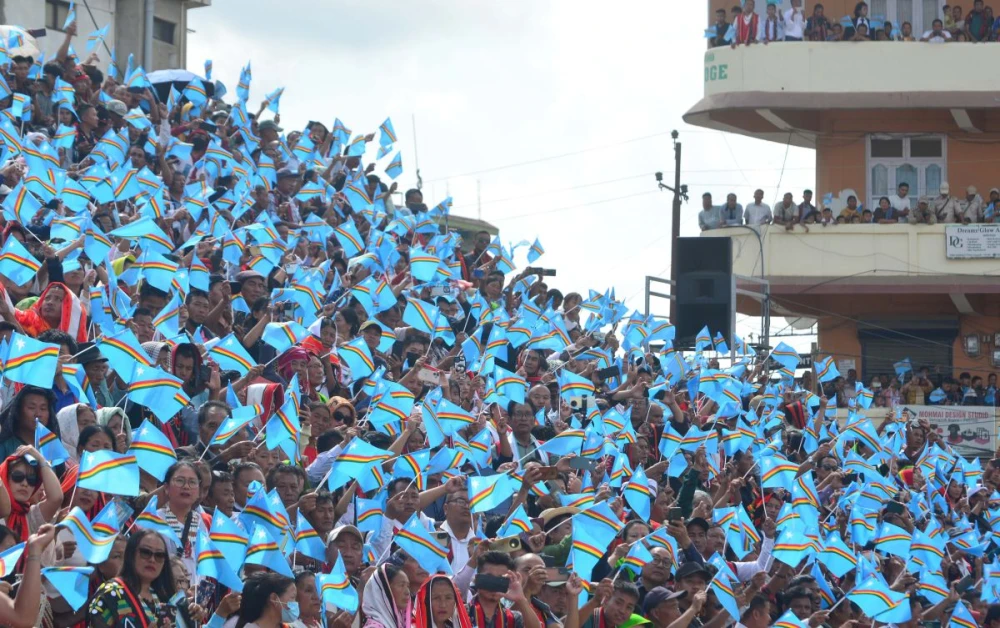NSCN (IM) General Secretary Th Muivah greets people waving Naga flags and cheering as he arrives for a civic reception at Senapati, Manipur, after visiting his birth village Somdal on October 29. (Morung Photo)

‘Naga flag and constitution non-negotiable,’ reiterates NSCN (IM) Ato Kilonser at Senapati
Senapati, October 29 (MExN): NSCN (IM) General Secretary/Ato Kilonser Th Muivah today reiterated that the letter and spirit of the Amsterdam Joint Communiqué (AJC) of July 11, 2002, and the Framework Agreement (FA) of August 3, 2015, had laid the important political foundation for the successful conclusion of the Indo-Naga political peace process between the Government of India (GoI) and the NSCN representing “Nagalim – past, present and future.”
In his message to the people during a civic reception in Senapati headquarters, the NSCN (IM) Chief Political Negotiator asserted that it included the “recognition and acknowledgement of Nagalim’s unique history and unique situation/position,” and that the violent military conflict “was not initiated by the Nagas but by the GoI.”
According to him, the Nagas did “not raise their hands” against Indian soldiers despite “extreme provocations” from 1946–55 and only after being “forced to the wall,” resorted to a “resistance war.”
Eventually, through the AJC and FA, the GoI recognised the unique position of the Nagas and has “officially recognised and acknowledged that Nagalim is not a part of India or Myanmar, either by consent or by conquest,” he asserted.

Muivah further contended they affirmed that the Indo-Naga conflict is political in nature and not an “internal matter” of either India or Myammar.
The third political foundation asserts that “sovereignty lies with the people,” recognising Nagalim’s sovereignty, with the Naga national flag and constitution as a constitutive identity and integral to the 2015 FA’s letter and spirit, he asserted.
He further stated that the FA officially recognises the “sharing of sovereign powers” in the political negotiation, encompassing the Naga national flag and constitution, independent of the constitutions of India or Myanmar.
He stated that the “sovereign powers” derived from the political negotiation the Yehzabo or Nagalim National Constitution and asserted that Nagalim shall be “sovereign in all matters of her own affairs,” and that the “sharing of sovereign powers” implies position outside the ambit of both India and Myanmar.
Muivah further maintained that the negotiated political settlement based on the FA shall be “inclusive of all Nagas, wherever they are,” who uphold and subscribe to the non-negotiable principles of unique history, sovereignty, territory, national flag, and national constitution.
He underscored that the late NSCN (IM) Chairman, Isak Chishi Swu, appended his signature to the historic FA, which “no one must violate or tarnish.”
While lauding the NSCN/GPRN for patient and sustained negotiations over the past 28 years, Muivah charged the GoI of trying to “betray the letter and spirit” of the FA by refusing to acknowledge the flag and constitution.
The Naga national flag and constitution, he reminded, are “non-negotiable and form the sole basis for a negotiated political settlement between the GoI and the NSCN – past, present, and future” termed it the foundation for “an enduring, inclusive, new relationship of peaceful coexistence between the two entities.”
Muivah also cautioned against what he termed the Indian state’s strategy of “divide and conquer” through the distortion and perversion of the FA’s letter and spirit and regretted that some Nagas have become “pawns in the hands of the GoI and its agencies.”

To this end, he asserted that the NSCN (IM) does not “recognise any agreement signed within the Constitution of India – past, present, or future,” and stated that any individuals or organisations promoting distorted interpretations of the AJC or FA would be considered “traitors.”
The AJC and FA as the “rallying point for Nagalim and the Naga people, wherever they are,” he added.
Meanwhile, he acknowledged the support and sacrifices of the southern parts of Nagalim for the Naga cause, noting their “renunciation of a servile mindset” and commitment to “Nagalim’s sovereignty and our inalienable right to live as a nation.”
Citing history, including the Zeliangrong Nagas’ fight against the British under the leadership of Haipou Jadonang, he noted that in honour of Jadonang’s supreme sacrifice and valour, the NSCN/GPRN has instituted the Jadonang Brigade.
The NSCN (IM) Ato Kilonser further recalled that the Naga National League (NNL), organised in September 1946, which played a key role in opposing the ‘artificial state’ boundaries imposed by the British and the post-colonial states of India and Burma.
It boycotted the General Election in 1948 and led the “No Tax Campaign” (1948), resulting in the martyrdom of seven persons, he added.
Muivah also highlighted that the Southern Nagas have borne the brunt of state “repressive and suppressive violence,” including the death of two students in May 2010 during his attempt to visit his birthplace, Somdal.
“I proclaim today that the dedication and sacrifice of the Naga brothers and sisters from Nagalim and the southern part of Nagalim is priceless and shall not go in vain,” he added.
He also expressed gratitude to them for defending the historic struggle and the decisive political steps taken by the NSCN (IM) in the ongoing Indo-Naga political peace process.
He alleged that India and Myanmar have deliberately branded Naga nationalism as “secessionist” to justify decades of militarisation and oppression under laws such as the Armed Forces (Special Powers) Act (AFSPA). Despite this, he said, it continues to stand firm.
Accordingly, Muivah lauded the committed Nagas in general, and the human rights and political activists from the Naga People’s Movement for Human Rights (NPMHR), student bodies, women’s organisations, tribe organisations, and other civil societies for their stand against what he termed the “repressive and oppressive stratagem.”






